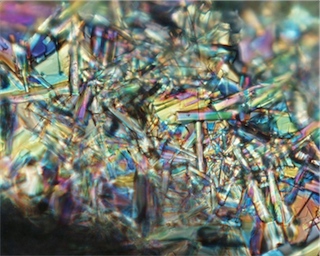Words fail me...
 Wednesday, May 14, 2008 at 11:02PM
Wednesday, May 14, 2008 at 11:02PM Came across this amazing graffiti animation over at Make blog (originally from BluBlu.org):
MUTO a wall-painted animation by BLU from blu on Vimeo
 Wednesday, May 14, 2008 at 11:02PM
Wednesday, May 14, 2008 at 11:02PM Came across this amazing graffiti animation over at Make blog (originally from BluBlu.org):
 Tuesday, April 22, 2008 at 10:26PM
Tuesday, April 22, 2008 at 10:26PM I was crawling through one of my favorite sites at the moment, io9, and came across a recent story about a man recently cleared of a number of charges stemming from his possession of bacterial cultures in his home. Where did this "mad science" stigma come from, I wonder? Has the hollywood portrayal of the evil genius cooking up destruction in his private liar/lab become so ingrained into the public's mind? I'm a scientist. When someone asks me what I do I'm proud to tell them that I'm a microbiologist. But I have, on occasion, wondered what what impression that makes on the person I'm meeting. Do they imagine that I'm concocting potions with wild abandon? Running around my lab with wild hair in my stained lab coat, muttering to myself?
I'll admit to the bit about the hair and lab coat, even to muttering on occasion. But for the record, I suck at potions.
 Thursday, April 17, 2008 at 10:19PM
Thursday, April 17, 2008 at 10:19PM An interesting video was recently published by Science. One part in particular caught my attention, however. One of the scientists mentions how the central dogma of science (DNA -> RNA -> protein) is becoming more complex by virtue of the fact that we are now discovering that the information is not as one-way as we thought. This got me to thinking (which can be dangerous): is the nucleus (or nucleoid, for us microbiologists) an evolutionary version of a hard drive? It would appear that the chromosome is not read-only, but rather read/write. Understanding the "write" functions better may even be the key to combating some of the nasty gene-oriented diseases such as cancer. Cancer cells are essentially cells that have lost the ability to control its replication. Maybe by sending the right command to the cell we could force the cell to perform a "soft reset" before it gets out of control.
I realize that controlling cancer is much, much more complicated than sending a simple command, I'm just wondering if this could be the next big biotech strategy...
(I think I may have just stumbled onto the subject of a future story project, as if I didn't already have enough on my plate already)
 Thursday, April 10, 2008 at 11:16PM
Thursday, April 10, 2008 at 11:16PM The past year, one of my ongoing research projects has involved crystalizing a protein of interest to the lab in which I work. One of the unexpected bonuses (aside from screening a never-ending procession identical looking drops of liquid while hunched over a microscope, of course) is occasionally stumbling across beautiful, if unintentional, crystals. The following image is a layer of lithium sulfate crystals resulting from allowing one of the drops a was working with evaporate:

This, to me, is proof that science does not have to be cold and calculating...even the unexpected can be beautiful.
 microscopy in
microscopy in  Science
Science  Tuesday, April 8, 2008 at 11:54PM
Tuesday, April 8, 2008 at 11:54PM Seeing this makes me wonder if giants feel the same way when they look back at their trail of foot-prints across the land. I agree with the narrator that the city-prints each contain their own form of beauty, but consider the cost in energy represented by each one. I'm no activist, by any means, but the majority of these lights are ultimately powered by a finite supply of fossil fuels:
 nasa
nasa